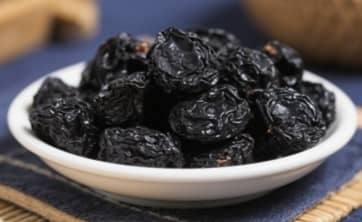The small black plum, or 乌梅 (Wu Mei), may be a familiar snack for many, but it is also a well-known medicinal herb in traditional Chinese medicine. While most people enjoy it for its sweet-sour flavor, not many are aware of its medicinal properties. Let’s dive into the world of 乌梅, uncovering its health benefits and medicinal uses.

Table of Contents
- Source and Types of Wu Mei
- Nature, Taste & Meridians
- Main Functions & Traditional Applications
- Modern Research & Applications
- Consumption Methods & Precautions
1. Source and Types of Wu Mei
Wu Mei refers to the unripe fruit of the plum tree, known as Qing Mei in Chinese. It has a history of cultivation dating back over a thousand years. The unique cultural significance of Qing Mei is reflected in historical sayings like “Looking at the plum stops thirst” and “Brewing wine with green plums to discuss heroes,” which are still well-known today. On the other hand, the dried fruit we commonly consume as snacks may come from ripe varieties like yellow plums or European plums. While both are derived from the same family, the medicinal qualities of Wu Mei are quite distinct.
2. Nature, Taste & Meridians
📌 Taste: Sour, astringent
📌 Nature: Neutral
📌 Meridians: Liver, Spleen, Lung, Large Intestine
Wu Mei has a balanced, neutral nature with astringent properties, making it effective for various conditions, especially those related to deficiency of Qi and fluids.
3. Main Functions & Traditional Applications
✅ Stops coughing and clears the lungs: Particularly useful for chronic or weak coughs
✅ Astringes the intestines and stops diarrhea: Treats long-standing diarrhea and dysentery
✅ Generates fluids and relieves thirst: Used for treating symptoms of dehydration caused by heat
✅ Treats roundworm-induced vomiting and abdominal pain: Helps address digestive issues caused by parasitic infections
📖 Compendium of Materia Medica says:
“Wu Mei is excellent for stopping coughing, astringing the intestines, and relieving thirst.”
4. Modern Research & Applications
Recent studies suggest that Wu Mei’s organic acids can react with metals like calcium, potassium, and magnesium to form salts, which could potentially lead to kidney stone formation. Moreover, when taken with alkaline drugs like theobromine or sodium bicarbonate, Wu Mei might neutralize their effects, thus reducing their efficacy. Therefore, it is essential to be mindful of interactions when using Wu Mei alongside other medications.
5. Consumption Methods & Precautions
Wu Mei can be used in various forms, including being roasted or applied externally for its astringent properties. However, it is not suitable for everyone. People with excess heat in the body, as well as pregnant women, those with excessive stomach acid, or ulcers, should avoid using Wu Mei.
✅ Conclusion
Despite its small size, Wu Mei packs a powerful punch in traditional medicine. It can aid in stopping coughing, treating digestive issues, and balancing the body’s fluids. However, it is important to use it wisely and avoid overuse, ensuring its health benefits are maximized without any adverse effects.